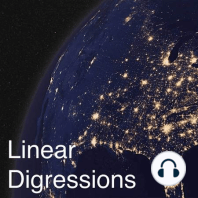9 min listen

Endogenous Variables and Measuring Protest Effectiveness
Endogenous Variables and Measuring Protest Effectiveness
ratings:
Length:
18 minutes
Released:
Jul 7, 2019
Format:
Podcast episode
Description
This is a re-release of an episode first released in February 2017.
Have you been out protesting lately, or watching the protests, and wondered how much effect they might have on lawmakers? It's a tricky question to answer, since usually we need randomly distributed treatments (e.g. big protests) to understand causality, but there's no reason to believe that big protests are actually randomly distributed. In other words, protest size is endogenous to legislative response, and understanding cause and effect is very challenging.
So, what to do? Well, at least in the case of studying Tea Party protest effectiveness, researchers have used rainfall, of all things, to understand the impact of a big protest. In other words, rainfall is the instrumental variable in this analysis that cracks the scientific case open. What does rainfall have to do with protests? Do protests actually matter? What do we mean when we talk about endogenous and instrumental variables? We wouldn't be very good podcasters if we answered all those questions here--you gotta listen to this episode to find out.
Have you been out protesting lately, or watching the protests, and wondered how much effect they might have on lawmakers? It's a tricky question to answer, since usually we need randomly distributed treatments (e.g. big protests) to understand causality, but there's no reason to believe that big protests are actually randomly distributed. In other words, protest size is endogenous to legislative response, and understanding cause and effect is very challenging.
So, what to do? Well, at least in the case of studying Tea Party protest effectiveness, researchers have used rainfall, of all things, to understand the impact of a big protest. In other words, rainfall is the instrumental variable in this analysis that cracks the scientific case open. What does rainfall have to do with protests? Do protests actually matter? What do we mean when we talk about endogenous and instrumental variables? We wouldn't be very good podcasters if we answered all those questions here--you gotta listen to this episode to find out.
Released:
Jul 7, 2019
Format:
Podcast episode
Titles in the series (100)
Lie Detectors: Often machine learning discussions center around … by Linear Digressions